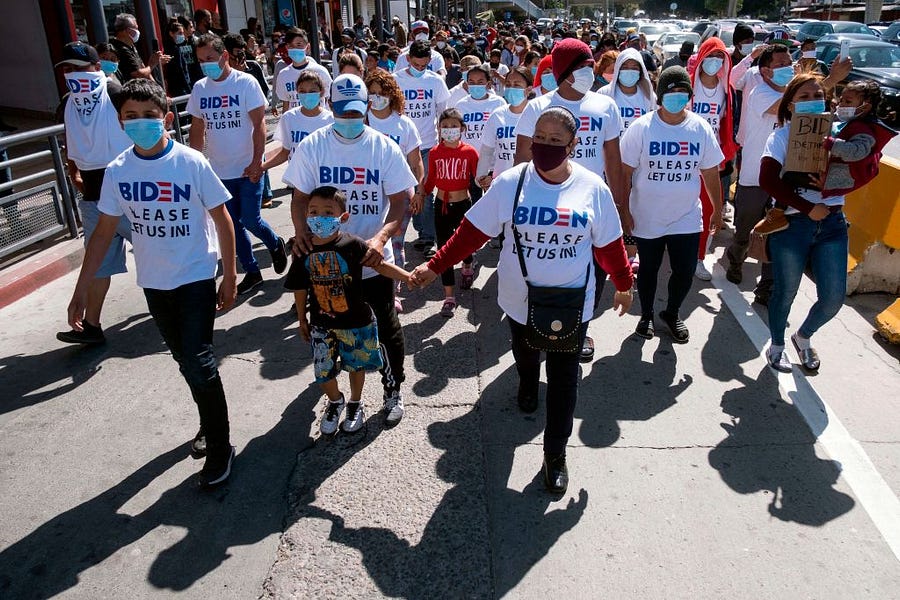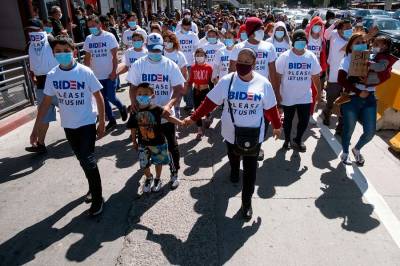Upon taking office earlier this year, President Joe Biden wasted no time in beginning to dismantle his predecessor’s immigration policy regime. Biden ended Trump’s travel ban, paused construction on the border wall, and stopped enforcing a rule intended to deny green cards to immigrants at risk of relying on public benefits like food stamps.
But the moves with the greatest immediate impact have been two concerning U.S. treatment of asylum seekers at the southern border: the partial rollback of Title 42, a rule the Trump administration used last year to close the border on account of the COVID pandemic, and the end of the Migrant Protection Protocols—better known as the Remain in Mexico policy—which stipulated that migrants seeking asylum at the U.S. border would remain in Mexican custody until their claim was adjudicated in court.
The administration has insisted these moves were necessary from a humanitarian perspective—thousands of migrants seeking asylum had clustered for months in slapdash camps just over the border in Mexico, living in squalid conditions while their claims inched through sluggish immigration courts. But the move has also opened the administration to fresh criticism from both conservatives and progressives—for different reasons—as the plan to open the border bit by bit has created new issues of its own.
On the left, criticism has been directed at the administration’s handling of unaccompanied minors apprehended at the border.
This requires a little explaining. When children are taken into custody, the government undertakes a complicated logistical process to determine what can be safely done with them while their case is pending—whether to release them into the custody of a family member already living in the U.S. or, if that proves impossible, to place them in a more permanent shelter overseen by the Office of Refugee Resettlement. When there are too many children for the government to process quickly, however, they are sometimes held temporarily in much sparer and less habitable ORR influx shelters.
Or that’s how it usually happens. Thanks to the Trump administration’s invocation of Title 42, however, the government spent most of last year summarily expelling immigrant minors by the thousands, arguing that the ordinary humanitarian protections to which they would be entitled were superseded by pandemic public health concerns.
As a result, many minors who would otherwise already have been processed have lingered in a state of limbo just across the border. When Biden reversed the order, these minors seem to have realized the time was right to try again: Apprehensions of unaccompanied minors have tripled in the past few weeks.
This has forced the Biden administration to rely on influx shelters to keep a roof over children’s heads while attempting to find longer-term lodging for them. This is what has drawn criticism from progressives like Rep. Alexandria Ocasio-Cortez, who described Biden’s use of influx facilities as “not okay … no matter the administration or the party” and evidence that “our immigration system is built on a carceral framework” in tweets last month.
According to the White House, such facilities are simply the best option available now given the number of migrant children who need to be processed in a short period of time.
“We can’t just undo four years of the previous administration’s actions overnight,” Roberta Jacobson, the former ambassador to Mexico who now oversees border affairs on the National Security Council, told reporters Wednesday. “Those actions didn’t just neglect our immigration system, they intentionally made it worse. When you add a pandemic to that, it will take a significant time to overcome.”
Republicans, of course, have a far different takeaway from the situation. They maintain that the administration’s struggles to handle the crush of unaccompanied minors simply demonstrates that Biden’s lenient policies are incentivizing more people to try to cross the border.
“They’re no longer expelling under Title 42 unaccompanied minors, which means that way more people have now been paying smugglers to bring unaccompanied minors to the border,” Mark Krikorian of the immigration hawk Center for Immigration Studies, told The Dispatch. “When you permit something, you’re gonna get more of it. … The combination of the perception that Biden is soft, with the reality in certain instances that he’s been soft, is the kind of thing that’s guaranteed to kick off a border surge like this.”
Meanwhile, GOP lawmakers scoff at the idea that the conditions of migrants held in Mexico under the Migrant Protection Protocols are so dire as to require special redress. “I have been down on the border, in the last year and a half maybe five times,” said Rep. Glenn Grothman, ranking member of the House Oversight Committee’s subcommittee on national security. “I’ve talked to many people down there. I have never heard complaints about the condition Mexico is holding people in. And Mexico is a fine country—I’m sure they are not going to be harming these children.”
In their public statements, the administration has tried to stake out a sort of middle ground on border control: explicitly repudiating the inhumane and at times explicitly cruelty-based policies of the Trump administration while remaining clear-eyed about the importance of maintaining a strong border.
“I want to be clear,” Jacobson told reporters Wednesday. “Neither this announcement nor any of the other measures suggest that anyone, especially children and families with young children, should make the dangerous trip to try and enter the U.S. in an irregular fashion. The border is not open.”
Yet she also acknowledged that the administration is attempting to achieve two policy goals at once—goals that can work in opposition to each other.
“We’ve seen surges before,” Jacobson said. “Surges tend to respond to hope, and there was a significant hope for a more humane policy after four years of, you know, pent up demand. … I certainly think that the idea that a more humane policy would be in place may have driven people to make that decision.”






Please note that we at The Dispatch hold ourselves, our work, and our commenters to a higher standard than other places on the internet. We welcome comments that foster genuine debate or discussion—including comments critical of us or our work—but responses that include ad hominem attacks on fellow Dispatch members or are intended to stoke fear and anger may be moderated.
With your membership, you only have the ability to comment on The Morning Dispatch articles. Consider upgrading to join the conversation everywhere.